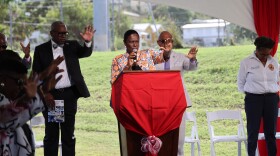ST. CROIX — The popular Virgin Islands madras is scheduled to be restocked at fabric stores this month following a resolution of manufacturing and distribution issues that has made the colorful and symbolic plaid fabric difficult to purchase without settling for unlicensed knockoffs available online.
VI madras, which was recently showcased by a local designer at a symposium in London, is a copyrighted design that is the intellectual property of the VI government, according to Act No. 8424, the 2021 law that established the official madras for the territory.
The Virgin Islands Council on the Arts, a division of the VI Department of Planning and Natural Resources, regulates the usage, distribution, and sale of the official print through a license with fabric stores but designers who sell items made from VI madras do not need a license.
Tasida Kelch, VICA executive director, acknowledged the lack of inventory for VI madras in fabric stores on St. Croix and St. Thomas due to high demand combined with initial supply-and-demand obstacles.
“Since this is an original design, it has to be made,” she said.
After experiencing problems with its original manufacturer, Kelch said VICA switched to another manufacturer that has assured her it can provide a consistent supply of the fabric. She said VICA expects to receive a new shipment of VI madras this month.
“We’ve managed to work out all those kinks, and we are hopeful that the plans that we’ve now instituted will help, you know, to keep it in the stores and have it readily accessible to everyone,” Kelch, who would not divulge the location of either manufacturer, said.
VI madras is more expensive than other madras color combinations because it is an original design that must be manufactured and shipped to the territory, Kelch said. She said VICA sells it at a set rate to the fabric stores.
Clara Santos, manager of Clara’s Special Occasions in the Sunny Isle Shopping Center, has been waiting for the Council on the Arts to resupply her stock of VI madras since July 2023. She is hopeful VICA will be able to stick to its timeline and provide her with new inventory this month.
“It actually brought in very good sales for myself and others, and it’ll be really nice, you know, for them to bring it in,” she said.
Santos said VI madras is in high demand by clothing designers who purchase 50-yard rolls as well as by customers who buy it per yard.
“It’s popular, something that is cultural, something that is the island itself, so, you know, everybody wants it,” she said.
Giana Abreu-Christopher, also known as “Regal,” is one of the territory’s clothing designers who has felt the impact from the limited supply of Virgin Islands madras.
“The inventory has always kind of been an issue for it,” she said.
Abreu-Christopher has been sewing women’s wear for the past decade on St. Croix. She learned her craft using African prints before incorporating madras fabric eight years ago into the clothing, hats, cultural head wraps, and other items she designs. She uses VI madras when she can find it in local fabric stores to make a variety of products she sells from her online business, designs by Regal.
“When it is available that is what I try to promote because it is our local madras and it’s beautiful and it’s in demand,” she said. “Everybody loves it.”

Vivian Ebbesen-Fludd, who sells VI madras when it is in stock in her family’s general merchandise and fabric store in downtown Christiansted, Ebbe’s Store, said she originally helped get the pattern weaved. She said she thinks the unknown demand for the print combined with the limited $5,000 budget initially posed an inventory challenge.
“That amount might have, after the fact, might have needed to be more because it’s quite an arduous task to get something weaved, get it shipped, you know, and then to get it distributed,” she said.
The initial $5,000 appropriation VICA received to manufacture VI madras was not sufficient to buy enough in the beginning, Kelch said. She said, however, VICA has been working to recoup funds through sales to fabric stores to purchase new inventory.
“It didn’t start out like that, but we’ve managed to get it to a place where that’s what’s going to start happening,” she said.
In addition to placing the Virgin Islands among other Caribbean nations that have adopted unique patterns to distinguish their islands, the official madras pattern for the Virgin Islands serves as a branding tool for the unification of the territory as well as a cultural heritage tourism product, according to Act No. 8424. It also serves as a symbol of pride for hundreds of thousands of Virgin Islanders at home and abroad.
Abreu-Christopher represented the Virgin Islands at a madras symposium held October 11 at the Victoria and Albert Museum in London, England called “Connecting Threads: Fashioning Madras in India and the Caribbean.”
“I came up and spoke about how, you know, we use madras in the Virgin Islands, how we incorporate it into so many things, how we still try to keep the traditions alive, how we have our own madras,” she said. “So, it was really an opportunity for me to promote our madras.”
A man from India spoke during the symposium about the authentic process of using a handloom to weave madras, discussing how the once thriving industry is quickly dying in India because it is hard for the less than 500 families who still weave madras manually to compete with the power loom industry, Abreu-Christopher said. She said other countries use a power loom to create madras that is not considered authentic.
“That’s where the difference in authentic madras comes in now because in India they still do it by hand, and that’s what they consider authentic,” she said.
WATCH: Abreu-Christopher speaks at symposium about authentic madras
During the symposium, Abreu-Christopher showcased how to tie a head wrap using one she made with VI madras. She explained the meaning of the colors in addition to discussing who created it.

The adoption of the official VI madras began with a conversation between Bradley Christian, St. Croix Heritage Dancers founder, and Mary Dema, Christiansted Community Alliance president, according to Act 8424. After St. Croix Heritage Dancers obtained grant funding through VICA, textile designer Debbie Sun was commissioned to develop the territory’s seven-color madras print.
“I know that in conversations with Mr. Bradley Christian that one thing he wanted to do when he thought about having the fabric, not just for the dance groups, but he wanted a fabric that could unify us no matter where we were in the world,” Ebbesen-Fludd said.
The colors in VI madras are symbolic. Turquoise represents the natural beauty of the water that surrounds the Virgin Islands, royal blue represents the deep sea and transport and discovery, pink represents the conch shell and the call to freedom, white represents the traditional dress made of flour sacks, yellow represents the territory’s official flower (Ginger Thomas), green represents natural resources and production, and red stands for strength and love. The design is a pattern that repeats every 7 inches in both the horizontal and vertical direction. Each madras may have the letters “V” and “I” embroidered into the fabric for ceremonial uses.
While VICA is responsible for supplying local fabric stores with official VI madras, Abreu-Christopher said she has found inexpensive knockoff versions of the fabric online from places in Canada, China, and the United Kingdom that are not advertised as VI madras.
“I’ve ordered samples from each,” she said, clarifying she does not use the knockoff prints in her designs since they are prohibited in the territory. “Some of them are different weight and quality.”

The VI Council on the Arts has been working to manage the distribution and enforcement of the official VI madras fabric. The task, however, has proven challenging as VICA navigates issues with counterfeit products and its limited resources.
Retailers or designers selling knockoff versions are not in violation if the fabric or product is not advertised as VI madras, Kelch said. If knockoffs are sold as VI madras, she said the Council has issued cease-and-desist orders but noted VICA has not yet established any fines or other penalties. She said VICA’s three-person staff does its best to stay in tune with what is happening.
“If we’re aware of it, we can do something,” Kelch said, adding that all violators will not be caught unless VICA receives a tip.
Kelch said some knockoff versions of VI madras have wider stripes in some areas, or three lines instead of four. She said those familiar with the official print can easily identify the imitations. She pointed out VI madras is made from 100% cotton, noting that the colors appear brighter in knockoffs made using a blend of cloth.
“You have knockoffs with any product, especially when it’s popular,” Kelch said. “We could just try our best to make sure that Virgin Islanders and people abroad know the difference between the authentic and the knockoff. But, you know, it’s pretty hard for anybody to control knockoffs.”

VICA partners with six fabric stores serving as licensed retailers of official VI madras, including three on St. Croix (Clara’s Special Occasions, Ebbe’s Store, and Divi Divi Fabrics) and three on St. Thomas (The Fabric Store, Fashion Playroom, and L&C Milliner).
In addition to purchasing VI madras from the licensed retailers, individuals, businesses, and organizations can purchase bulk orders over 50 yards directly from VICA on St. Croix and St. Thomas by calling the Council at 340-774-5984.















